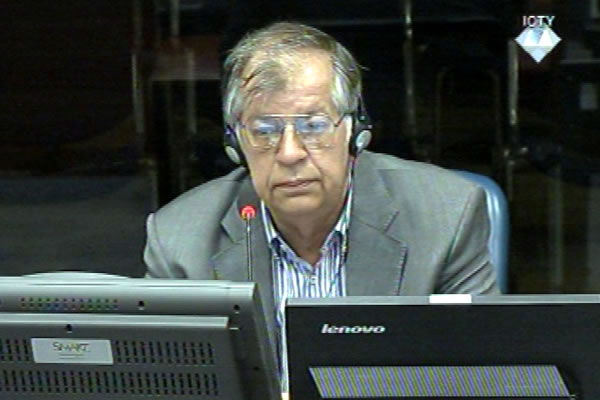Home
KECMANOVIC: ‘NO GENOCIDE IN BH’
Although Nenad Kecmanovic has stated on a number of occasions that crimes – genocide included – were committed in BH, now, as he testifies in Ratko Mladic’s defense, he explained that it was his ‘fault’ that the term ‘genocide’ was mentioned at all. ‘None of the ethnic communities in BH wanted to exterminate others’ in a way comparable to what Nazis had done to Jews
 Nenad Kecmanovic, defence witness at Rako Mladic trial
Nenad Kecmanovic, defence witness at Rako Mladic trial Although it was announced on Friday that witness Nenad Kecmanovic would have to return to Belgrade for private reasons and return to The Hague in late August to complete his evidence in Ratko Mladic’s defense, he changed his mind and appeared in court Monday morning. In two hours of the re-examination, defense counsel Branko Lukic tried to rehabilitate his witness by giving him an opportunity to correct the parts of his evidence that, in his view, didn’t favor the accused.
In his expert report for the Kvocka et al. case, Kecmanovic stated that while he was still in Sarajevo (he left on 6 July 1992) he had the impression that the city was shelled ‘randomly’ from the Serb positions. Last week in the cross-examination the witness stressed that it ‘was only an impression’. Monday, Kecmanovic explained that there were two military facilities near his apartment in the Ciglane neighborhood in Sarajevo. The BH Army 1st Corps HQ and the artillery weapons hidden in a tunnel were targeted by the Serb forces. Kecmanovic thus implied that his ‘impression’ that the shelling was random was in fact wrong.
In the same expert report, the witness mentioned Radovan Karadzic’s speech at a BH Assembly session: Karadzic told the deputies that war could drag BH to Hell, and Muslims into possible disappearance. In his report, Kecmanovic used the phrase ‘a shocking statement’ to describe the speech. Last week, Kecmanovic corrected himself, saying that it was in fact a ‘warning’, albeit a ‘shocking’ one. The defense lawyer noted that Karadzic was prone to issuing ‘warnings’ and went on to show another part of his assembly address, where Karadzic asked his political opponents ‘how will you prevent a situation where people will be killing each other in BH’. Karadzic also said he wouldn’t stop speaking until the issue of the BH secession was taken off the agenda. Kecmanovic agreed that here the Bosnian Serb leader issued ‘another warning’.
Last week in the cross-examination the witness was confronted with the claims he had made in his expert report for the Kvocka et al. case, with the transcripts of his speeches while he was one of the BH Presidency members at the beginning of the war and with his subsequent interviews in the Belgrade media. Kecmanovic told the media that the Serbs had expelled and detained Bosnian Muslims and that the ethnic composition of BH had been completely transformed ‘through violence, war and genocide’. Last week, the witness confirmed those claims in part. Monday, Kecmanovic explained that the ethnic composition had changed because people wanted to leave BH because in fear of war and concerns over the safety of their families.
The witness stressed that the mention of the term ‘genocide’ was his ‘fault’ because in his view a crime at such a scale had not been committed in BH. According to Professor Kecmanovic, until recently, genocide was defined as a systematic destruction of a people, such as for instance the destruction of the Jews by the Nazis. There was no such thing in BH, because ‘none of the ethnic communities wanted to destroy others’, Kecmanovic noted.
After Kecmanovic completed his evidence, the defense called Milorad Sehovac. During the war, Sehovac commanded the 2nd Sarajevo Brigade in the Bosnian Serb Army.
Linked Reports
- Case : Mladic
- 2014-07-11 NENAD KECMANOVIC REVISES ERSTWHILE OPINIONS AND POSITIONS
- 2014-07-10 NENAD KECMANOVIC WAS DELUDED FOR TWENTY YEARS
- 2014-07-09 MLADIC’S WITNESS: SERBS ARE GENETICALLY STRONGER, BETTER, HANDSOMER AND SMARTER
- 2014-07-15 MLADIC'S WITNESS: BH ARMY VIOLATED LAWS OF WAR
- 2014-07-16 SERB FROM FOCA BLAMES ‘DOGS OF WAR’ FROM SERBIA AND MONTENEGRO FOR CRIMES
- 2014-07-17 GUARD FROM ‘RECEPTION CENTER’ FOR WOMEN IN FOCA TESTIFIES AT MLADIC TRIAL
